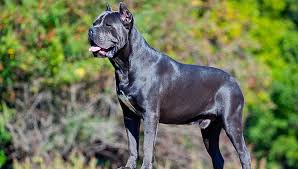
Cane Corso
Conditions of detention
Cane Corsos are adaptable to various living conditions but thrive best in homes with ample space, such as houses with large yards. They are not well-suited for apartment living due to their size and need for regular exercise.
Useful Fact: These dogs require a secure, fenced yard to provide them with space to exercise and play safely, preventing them from wandering off or encountering potential hazards.
Nutrition and diet
A balanced diet with high-quality dog food, rich in proteins, fats, vitamins, and minerals, is essential for the Cane Corso. Their diet should support their muscular build and active lifestyle.
Useful Fact: Due to their large size and rapid growth, it is important to feed them a diet formulated for large breed puppies to ensure proper bone and joint development.
Health
Cane Corsos are generally healthy but can be prone to certain hereditary health issues such as hip dysplasia, elbow dysplasia, and heart conditions.
Useful Fact: Regular veterinary check-ups and maintaining a healthy weight through proper diet and exercise can help prevent and manage health issues common in the breed.
Grooming and care
The Cane Corso has a short, dense coat that requires minimal grooming. Regular brushing helps to keep their coat healthy and reduce shedding. Common coat colors include black, gray, fawn, and brindle.
Useful Fact: Bathing should be done as needed, typically every few months, or when they get particularly dirty. Regular ear cleaning and nail trimming are also important for their overall hygiene.
Education and training
Cane Corsos are intelligent and eager to please but can also be independent and strong-willed. Positive reinforcement methods work best, along with consistent and firm training.
Useful Fact: Early socialization and obedience training are crucial to ensure they develop good manners and are well-adjusted to various environments and situations. Proper training helps manage their protective instincts.
Toys and entertainment
Cane Corsos enjoy toys that are durable and can withstand their strong jaws. Chew toys, interactive toys, and tug-of-war ropes are ideal.
Useful Fact: Providing them with engaging toys can prevent boredom and the development of destructive behaviors, keeping them mentally and physically stimulated.
Safety
Given their size and strength, it is important to supervise Cane Corsos during interactions with other animals and in public spaces. Secure fencing is essential to prevent them from wandering off.
Useful Fact: Leash training is important for safety during walks, as they can be strong pullers due to their muscular build and protective nature.
Accessories
Sturdy collars, leashes, and harnesses designed for large and strong dogs are suitable for Cane Corsos. Comfortable bedding and durable toys are also recommended.
Useful Fact: A harness can provide better control during walks and prevent strain on their neck, especially important given their strength.
Socialization
Early socialization helps Cane Corsos become well-rounded and confident dogs. Exposure to different environments, people, and other animals is key.
Useful Fact: Positive socialization experiences can help manage their natural protective instincts and ensure they are comfortable in various settings.
Travel and Transportation
Cane Corsos can be good travelers if acclimated to it early. Using a secure and comfortable crate or carrier during transportation ensures their safety and reduces stress.
Useful Fact: Regular breaks during long journeys help them stay comfortable and hydrated, reducing travel-related anxiety.
Behavior and psychology
The Cane Corso is known for being loyal, protective, and intelligent. They form strong bonds with their family and are generally good with children and other pets if properly socialized.
Useful Fact: Understanding their need for companionship and mental stimulation can help in creating a balanced and happy environment for them.
Legal aspects
Ownership regulations for Cane Corsos may vary by region. Adherence to local laws regarding pet registration, vaccinations, and leash laws is important.
Useful Fact: Keeping updated identification and health records helps ensure compliance with legal requirements and safeguards their wellbeing.


